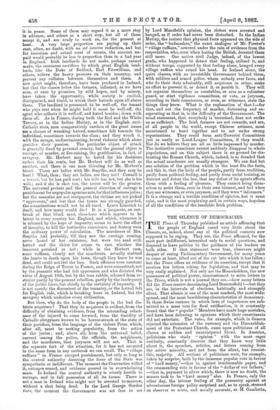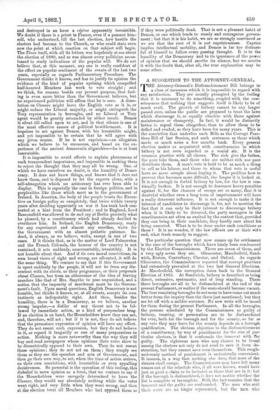THE SILENCE OF DEMOCRACIES.
THE Times of Thursday published an article affirming that the people of England cared very little about the Closure, or, indeed, about any of the political contests now supposed to be raging. They are, the Times affirmed, for the most part indifferent, interested only in social questions, and disposed to leave politics to the guidance of the leaders on both sides. If that statement were time, observers might despair of seeing Parliamentary Government, for many years to come at least, lifted out of the rut into which it has fallen ; but the Times offers no evidence of its assertion, except that it receives few letters asking for legislation, and that may be very easily explained. Not only are the Householders, the new possessors of political power, unaccustomed to write letters to the Times, which is not a journal they see,—how many letters did the Times receive denouncing Lord Beaconsfield ?—but they are, in the intervals of elections, habitually and strangely silent. That silence is one of the most marked, the most wide- spread, and the most bewildering characteristics of democracy. In those Swiss cantons in which laws of importance are sub- mitted to a mass vote for final ratification, it is constantly found that the " popular " Members have made huge mistakes, and have been deferring to opinions which their constituents did not entertain. The votes, for example, which in Geneva rejected the extension of the currency and the Disestablish- ment of the Protestant Church, came upon politicians of all classes as sudden and unanticipated blows. In America, politicians who study " opinion " with the most eager assiduity, constantly discover that they know very little about it, the speeches, articles, and letters coming from the active minority, and not from the silent, but irresist- ible, majority. All sections of politicians were, for example, taken by surprise, both by the immense popular vote in favour of "hard money,"—that is, against irredeemable paper, and the commanding vote in favour of the "dollar of our fathers," —that is, payment in silver which, there is now no doubt, the masses took to be "hard money" also. In France, only the other day, the intense feeling of the peasantry against an adventurous foreign policy surprised and, so to speak, stunned an observer so acute, and usually accurate, as M. Gambetta,
and destroyed in an hour a regime apparently irresistible. We doubt if there is a priest in France, even if a peasant him- self, who understood, till the last election, how hostile the electors had become to the Church, or who could state even now the point at which reaction on that subject will begin. The Times itself, with all its letters, was hopelessly at sea about the election of 1880, and so was almost every politician accus- tomed to study indications of the popular will. We do not believe that, at this moment, any one is really confident of the effect on popular sentiment of the events of the last two years, especially as regards Parliamentary Procedure. The Government thinks it knows, and has to justify its opinion the evidence of the kind of popular uprising which compelled half-hearted Members last week to vote straight ; and we think, for reasons beside our present purpose, that feel- ing is even more bitter than the Government believes, but no experienced politician will affirm that he is sure. A disso- lution on Closure might leave the English vote as it is, or might reduce the Liberal majority, or might extinguish the Tory representation in boroughs, and no Liberal or Tory agent would be greatly astounded by either result. Demos is silent till called upon to act, and in that silence is one of the most effective causes of political bewilderment. It is hopeless to act against Demos, with his irresistible might, and yet impossible to be certain that he will agree with any given course. If he is not capricious—an allegation which we believe to be erroneous, and based on the ex- perience of the ancient democratic oligarchies—he is at least inscrutable.
It is impossible to avoid efforts to explain phenomena of such transcendent importance, and impossible in making them to reject the thought that they may all be wrong. One, of which we have ourselves no doubt, is the humility of Demo- cracy. It does not know things, and knows that it does not know them, and is disposed to let the experts alone, with a self-abnegation which no aristocracy has ever been able to display. This is especially the case in foreign politics, and in perplexities like those which meet us in the government of Ireland. In America, the body of the people trusts the Execu- tive on foreign policy so completely, that twice within twenty years after deciding apparently on war it has sunk back con- tented at a hint from the President ; and in England, Lord Beaconsfield was allowed to do and say at Berlin precisely what he pleased, by a constituency which had already decided to overthrow him. In Ireland, the English Democracy, ready for any experiment and almost any sacrifice, waits for the Government with an almost pathetic patience. In- deed, it always, as we believe, waits, except in one of two cases. If it thinks that, as in the matter of Lord Palmerston and the French Colonels, the honour of the country is not sustained, it acts suddenly, unaccountably, irresistibly. It is not humble about that. And if its own moral convictions, its own broad views of right and wrong, are affronted, it will do the same thing. We venture to say that if this Government is upset suddenly by the people, it will not be from any dis- content with its chiefs, or their programme, or their proposals about Closure, but from an abhorrence of the idea of leaving murders like that of Mrs. Smythe to pass unpunished, and a notion that the impunity of murderers must be the Govern- ment's fault. Upon moral questions, English Democracy is not humble, but thinks it knows, or, at all events, accepts its own instincts as indisputably right. And then, besides the humility, there is in a Democracy, as we believe, another strong impulse,—a dislike of any threat not to be fol- lowed by immediate action, as a kind of purposeless brag. If an election is on hand, the Householders know they can act, and, therefore, will act ; but if it is not, they do not believe that the premature expression of opinion will have any effect. They do not resent such expression, but they do not believe in it, or regard it languidly as one of many preparatives to action. Nothing is more noteworthy than the way they will buy and read newspapers whose opinions their votes show to be diametrically opposed to their own. They do not resent those opinions ; they do not act on them ; they simply see them as they see the speeches and acts of Government, and then go their own way, to act, when the time of action arrives, on their own convictions, with irresistible or even appalling decisiveness. So powerful is the operation of this feeling, this disbelief in mere opinion as a force, that we venture to say if the Householders were savagely determined to have the Closure, they would say absolutely nothing while the votes went right, and very little when they went wrong, and then at the election treat all Members who had opposed them as if they were politically dead. That is not a pleasant habit of Demos, or one which tends to steady and courageous govern- ment; but that it is his habit, we are as strongly convinced as we are that the root of it is not capriciousness. Caprice implies intellectual mobility, and Demos is far too distrust- ful of himself to follow every passing thought. It is to the humility of the Democracy and to its ignorance of the power of opinion that we should ascribe its silence, but we ascribe it with the doubt that, after all, the true explanation may be some other.



































 Previous page
Previous page